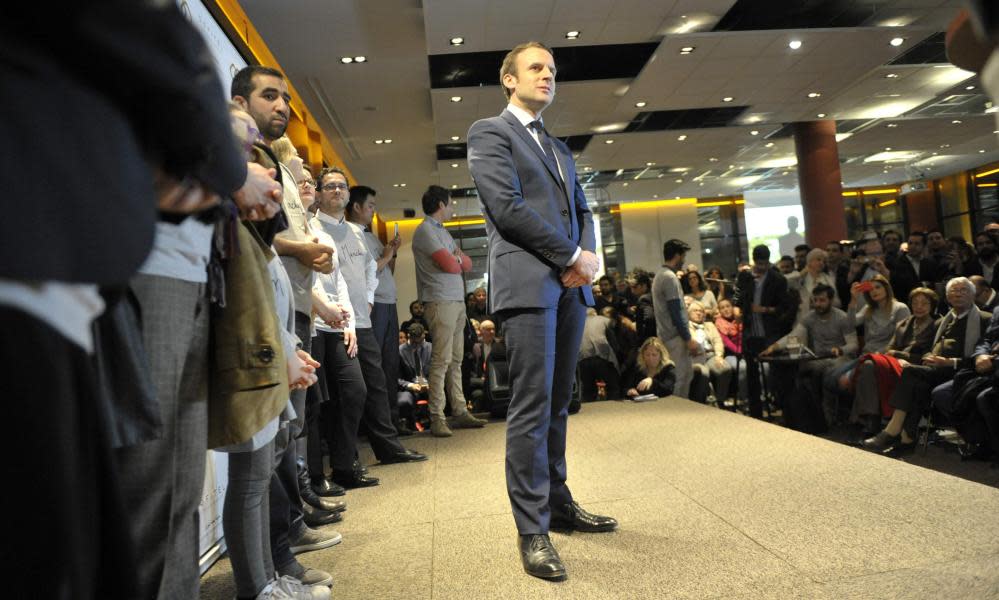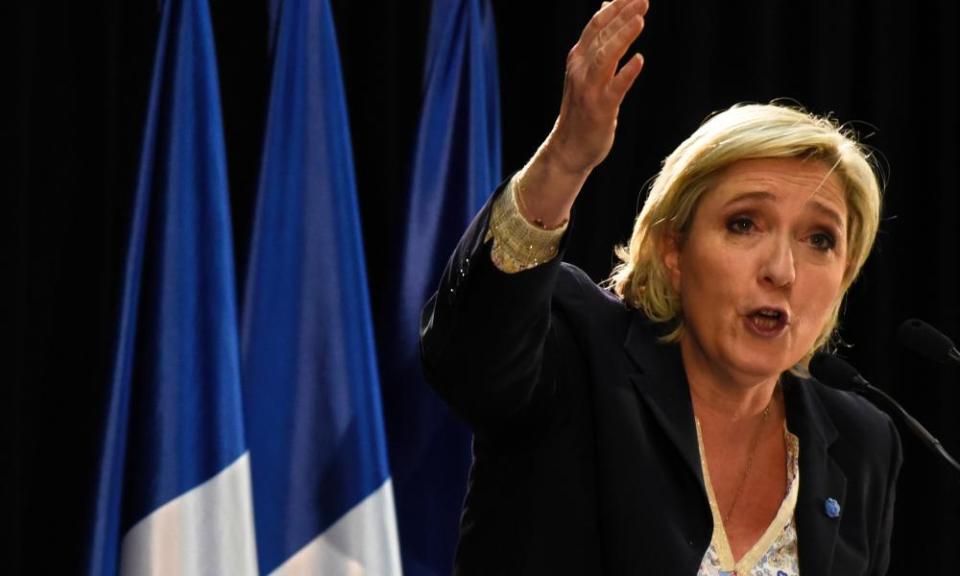Emmanuel Macron must add substance to style to win votes for presidency

As Emmanuel Macron’s polling numbers wobbled early last week, his supporters held their breath as critics lined up to mock the presidential ambitions of the man they call Monsieur Plexiglas.
The French love giving their leaders nicknames; it was Marine Le Pen who devised Macron’s moniker, intended to suggest she could see right through him, that he was a kind of political hologram lacking all substance.
Centre-right candidate François Fillon echoed the criticism, accusing the former Socialist government minister and investment banker of inventing something radically new in French politics – “the presidential campaign without a presidential programme”.
Macron kept his counsel. It was better, said advisers, to stick to broad brush strokes than present a programme that was ill-prepared and vulnerable to being shot down in flames. But a moment of truth will shortly arrive for this youthful centrist politician who, without overly elaborating on what he wants to do in office, has become many people’s white knight in the battle to keep Marine Le Pen out of the Élysée palace.
Macron will add the missing substance to his style when he reveals a programme he promises will jump-start the stagnant French economy, reduce the country’s deficit and bring down unemployment – a feat his political mentor François Hollande (nicknamed Mr Flanby after a wobbly French pudding) failed to pull off, scuppering any chance of a second term.
The Macron manifesto – called Contract with the Nation – is the result of a consultation with 400 experts and advisers, 30 working groups and the sifting of a raft of ideas from grassroots supporters. Each element has been tested during “themed meetings” and local committee consultations before being approved. Nothing, we are told, has been left to chance.
As nationalist and populist parties make strides across Europe, some see Macron as the champion of a revitalised centre. David Miliband, the former Labour foreign minister, is a fan, telling the Times yesterday that “the Macron phenomenon is real. He’s built something extraordinary”. Last week he won the support of veteran middle-man François Bayrou, further consolidating his centrist credentials.
Macron prefers to be called “progressive” rather than “centrist”. So far, he has cherrypicked across the political spectrum: his social politics are liberal and so are his economics, and there’s a smattering of environmentally friendly ideas to tick green boxes. Le Monde described his programme, which includes €25bn in public spending cuts and the loss of 120,000 civil service jobs – Fillon wants to lose 500,000 – as “social-liberal”. Critics accuse him of being a pale imitation of Tony Blair, selling the well-trodden path of the “Third Way” as if it were virgin territory. Like Blair, Macron is big on New Labour-style conceptual pairs, such as “rights and responsibilities”.
Éric Coquerel, spokesman for the leftwing Parti de Gauche founded by Jean-Luc Mélenchon, also a presidential candidate, has invoked the memory of another British prime minister, arguing that Macron was “on the march towards the Thatcher past”. “If people detested Sarkozy and Hollande … Emmanuel is even worse,” Coquerel told Libération.
During recent weeks of campaigning and visits to Algeria, where he sparked a row by calling colonisation a “crime against humanity”, and London, where he met Theresa May, Macron has tested his ideas.
The launch of the manifesto will also reveal what, if any, concessions have been made to Bayrou, 62, whose unexpected support last week gave Macron an instant fillip in the polls. Jérôme Fourquet, of pollsters Ifop, told the Observer that Macron’s support had jumped from 19-20% to 23.5% following the announcement.
It was a win-win move for Macron, 39, who saw a dangerous rival removed from the race, and gained an older political head to complement his youthful appeal. “It is very important for Macron, whose campaign is reminiscent of Bayrou’s in the 2007 presidential election when he spoke of the left-right divide and the need to rebuild French political life. Many people were interested by this idea, but apart from his own troops it was not followed by any great movement to back him and he remained third,” Fourquet said.

“Now Macron is saying it’s important to rise above this left-right divide, and two months from the election we are seeing a wave of people from left and right rallying around him, and a dynamic that suggests in all the polls he will be in the second round.”
Macron is still behind the far-right Front National’s Le Pen, 48, whose predicted 26% in the first round has remained relatively solid, but with his current support would push Fillon at 20.5% into third place. In the same poll, leftwing candidate Benoît Hamon, 49, of the Socialist party – now supported by the Ecology party – scored 13% and Mélenchon 11% (the latter have been meeting to discuss fielding just one leftwing candidate, but neither is currently prepared to stand down).
Fourquet believes Bayrou’s perceived “sacrifice” could play well for Macron in human terms: “Bayrou is a political animal. He lives for the presidential election and he has stood down for Macron. Of course, there’s something a little theatrical in all this, but we know Bayrou would have liked to stand and the fact he sacrificed himself is really something important in the eyes of the French. We will have to see how this relationship works long-term, and how many others will follow him into an alliance.”
Modern French presidential elections have traditionally followed a pattern of what the French call “alternance”, a five-year flip-flop between the mainstream left and right. Every French leadership election has had its wild cards, but these have been – with one notable exception – relegated to also-rans after the first round (the exception was in 2002, when Jean-Marie Le Pen shocked everyone, including himself, by getting into the second round, where under the “republican pact” everyone else ganged up to defeat him).
Historically, however much contrarian French voters like to follow their ideological hearts in the first round and their practical heads in the second, the winner is inevitably from the mainstream right or left. Given the current febrile political moment, this election feels far more unpredictable.
At a rally in London last week, Macron turned on the charm to woo French expatriate voters. Supporters waved banners and flags marked EM – Emmanuel Macron’s initials as well as those of his political movement, En Marche! (Let’s Go!). Fans lined up to take the microphone to talk of “renewal”, “courage” of “tearing down walls” and “daring to take risks”. Many were young, from a generation that feels it has been excluded and ignored by French leaders and the political establishment.
That Macron, as a graduate of the exclusive École Nationale d’Administration (ENA), a former Socialist government minister and a Rothschild banker, has long been part of that establishment matters little. He speaks to them.
“They say you have to start with a quote from a great author … there’s a great author called Boris Johnson who said a little while ago … that London is the sixth French city,” Macron declared, prompting jeers, boos and whistles from the crowd. “No, no, we never whistle,” he admonished them. “Leave that to those who have no hope, no project and who are ashamed. We don’t whistle” (a clear dig at rivals Le Pen and Fillon, who are under investigation in separate “fake” job scandals).
Back in France, the real decider, Fourquet says, will be how many government ministers and MPs will reject their official Socialist party candidate, Hamon, and throw their support behind not-right-not-left Macron: “Given the danger of Le Pen winning, and given Hamon seems unlikely to make the second round, it’s possible they will say: we don’t have a choice, we have to go with whoever will win against Le Pen, and that’s Macron.”
KEY DATES
Netherlands General elections take place on 15 March to choose members of the House of Representatives.
France Presidential elections take place in April and May. The first round is on 23 April, then the two leading candidates face each other in a runoff on 7 May.
Germany Elections to the Bundestag federal parliament take place on 24 September.

 Yahoo News
Yahoo News 
